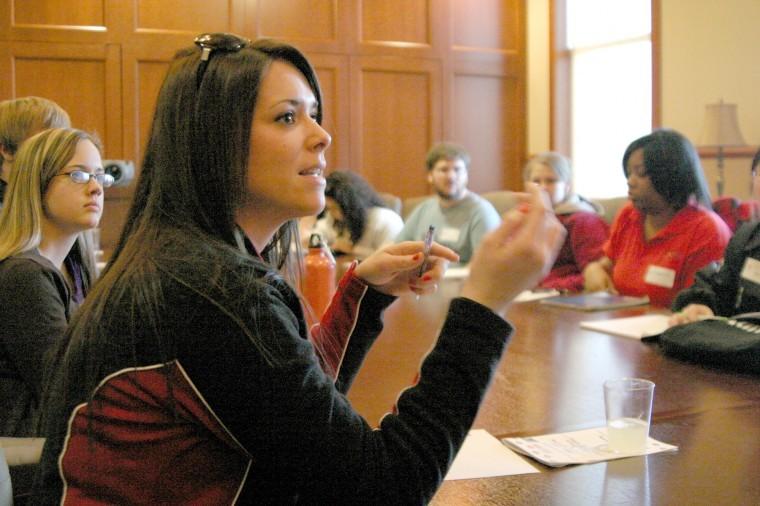Students head for destination graduation with help of seminar
Nicole Gault | Northern Star Nicole Kelly, senior public health major, asks questions during Destination Graduation’s first break out session, “Surviving and Thriving Through the Job Search,” Wednesday night at Altgeld Hall.
March 30, 2011
For NIU seniors, graduation is right around the corner. Many of them are asking, “well…now what?”
Over 60 students went to Altgeld Hall Wednesday evening hoping to have that question answered by attending Destination Graduation, sponsored by the Office of Student Academic Success.
During the two-hour event, students were able to choose from 10 different sessions, ranging from topics like budgeting student loans and debt, transitioning from college to the professional world, and surviving moving back home.
Missy Lugo, OSAS student success specialist, briefly addressed the audience before the students split up.
Lugo recommended students view their degree progress reports and meet with an academic advisor to avoid any graduation-delaying surprises.
“It’s not something I want to scare you with, but it does happen,” she said.
After Lugo finished, she dismissed the crowd and many stayed inside Alteld Auditorium to attend “Transitioning from College to the Professional World.”
The discussion was presented by Alicia Czachowski, assistant director of Health Enhancement , and Shana Stringfellow, graduate assistant for Health Enhancement.
Czachowski began the discussion by recommending that students figure out where they will be living after graduation.
“Start to talk to your parents now if you’re moving back in,” she said.
Czachowski said discussing issues like curfew, guests and whether or not returning students should pay rent would ease the transition home.
Besides moving, most students will be beginning new careers, and Czachowski said Career Services can help structure a personalized résumé or cover letter.
Stringfellow suggested students should be looking for jobs by the beginning of senior year, and should be willing to adapt.
Iesha Washington, senior public health major, shared her experiences with the group.
“For the first interview, I was really nervous, but I got more comfortable by the second and third,” she said. “I just need to decide which [job] will be the best for me.”
Stringfellow recommended maintaining a healthy level of stress and keeping priorities in order.
“When you get to grad school or the professional world, your life changes,” she said. “But you come first.”
Instead of going right into the professional world, many students will be attending graduate school. Lyndon Perkins, director of recruitment and student support services, provided the group with his “Top 10 Mistakes People Make in Applying to Graduate School.”
“Even students with high GPAs and great GRE scores make the same mistakes,” Perkins said.
Perkins recommended carefully choosing who students get their letters of recommendation from.
“Use letters of recommendation from people who know your academic record,” he said.
Perkins also derided failing to research graduate school programs and assuming that graduate schools have a minority quota to fill.
Lastly, Perkins suggested applying for fellowships. Unlike scholarships, students are not limited to how many fellowships they can have.
“The money is out there, you just have to find it,” he said.







